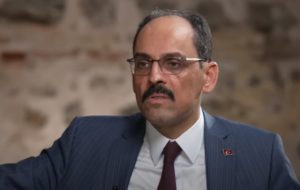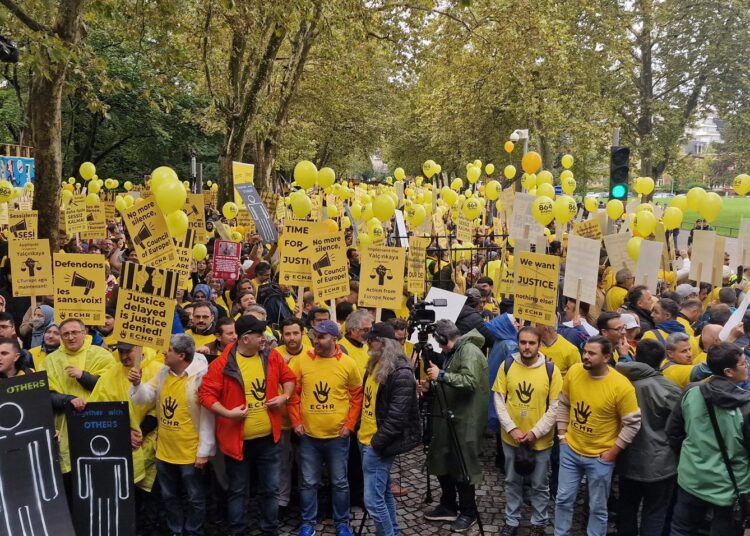Abdullah Bozkurt/Stockholm
Classified Turkish government documents disclose that Turkey’s primary intelligence agency has discreetly set up a surveillance and monitoring operation in a well-protected French city that hosts several major European institutions.
The network, operating under the direct authority of the Turkish intelligence agency Milli İstihbarat Teşkilatı (MIT), was mobilized during a peaceful demonstration held on October 2, 2024, by a group critical of the Islamist government of President Recep Tayyip Erdogan.
Turkish intelligence operatives relayed information gathered on the activities of approximately 2,000 individuals who assembled outside the European Court of Human Rights (ECtHR), the judicial arm of the Council of Europe (CoE).
The group was protesting the widespread human rights abuses committed by the Erdogan government in Turkey and urging the ECtHR to expedite thousands of cases filed by Turkish plaintiffs. These cases, submitted to the court in Strasbourg, seek redress for the severe injustices suffered under a CoE member state.
The intelligence report on the demonstration was sent to the agency headquarters in Turkey, where it was subsequently disseminated to various government agencies to enable punitive measures against individuals who protested Turkey’s actions before the European court.
One document, obtained by Nordic Monitor, reveals that the Directorate for General Security (Emniyet), Turkey’s principal law enforcement agency, received the MIT intelligence report on October 23. About two weeks later, Emniyet instructed its provincial branch in the northeastern province of Samsun to take action against those identified in the MIT report.
A two-page document issued by the General Directorate of Security in Turkey details intelligence surveillance operations conducted in Strasbourg, France:
It appears that same intelligence was also shared with other provinces, distributed based on the residency and birth registration records of individuals monitored by MIT in the French city.
The document referred to the intelligence agency using an institutional code “V” to conceal the origin of the intelligence, likely in anticipation of potential fallout from the scandal surrounding covert surveillance conducted in Turkey’s NATO ally, France.
The Erdogan government has significantly expanded its covert intelligence operations across Europe over the past decade, particularly in Germany, France and the Netherlands, where large Turkish expatriate communities reside.
Bolstered by substantial financial resources and political backing from the Erdogan administration, Turkish intelligence has ramped up its aggressive surveillance efforts in Europe, recruiting hundreds of informants and developing assets within Turkish and Muslim communities.

The Turkish intelligence agency’s objectives extend beyond monitoring and harassing critics in Europe. It seeks to influence political decision-making in key European capitals, gather sensitive information to exploit potential vulnerabilities in the social fabric of European societies, forge connections with mafia and organized crime groups and acquire technological expertise that could be transferred back to Turkey. These efforts are aimed at bolstering the Erdogan government’s ambitious political agenda and enhancing capabilities in defense and military programs.
MIT has enlisted numerous NGOs as facilitators in Turkey’s extensive information and intelligence-gathering campaign, deploying agents under the cover of academics, imams, journalists and private-sector professionals. In a sharp departure from past practice, more operatives have been stationed in Turkish embassies and consulates under diplomatic cover.
The espionage activities in Strasbourg are merely one aspect of the broader intelligence network that the Turkish government maintains across Europe.
The demonstration in Strasbourg was organized by the Peaceful Actions Platform, a coalition of 24 civil society groups from across Europe, with the aim of drawing attention to the systemic human rights violations that have persisted in Turkey under President Erdogan’s repressive regime. Over 2,000 people participated in the event, according to the organizers.
The profiling of demonstrators in Strasbourg could have profound and far-reaching consequences for both themselves and their family members residing in Turkey. Many of these individuals are already the subjects of criminal investigations based on spurious terrorism charges, with arrest warrants issued against them in absentia.
A sample page from the 102-page surveillance report by Turkey’s intelligence agency is shown. Redactions were applied by Nordic Monitor to protect the identities of individuals unlawfully profiled:
Should they return to Turkey, they face a high risk of imprisonment, the potential seizure of assets and punitive action targeting their families, friends and associates. Moreover, they are likely to be denied access to essential consular services provided by Turkish embassies and consulates abroad, including notarial services, birth and death registrations and voter registration.
The demonstrators accused Turkish authorities of disregarding European Court of Human Rights (ECtHR) rulings, particularly in the cases of philanthropist Osman Kavala, Kurdish leader Selahattin Demirtaş and teacher Yüksel Yalçınkaya. Despite ECtHR decisions affirming rights violations, Turkey has continued its crackdown on opposition figures, with a primary focus on supporters of the Gülen movement.
Speakers at the event shared harrowing personal accounts, including unjust imprisonments, perilous escapes and the profound effects of family separations. Former NBA player Enes Kanter Freedom and Moldovan MP Constantin Starîș called for international solidarity and urgent action to uphold human rights standards. Kanter, a Turkish-American, has been a vocal critic of Turkey’s human rights abuses, particularly those targeting members of the Gülen movement, with which he is affiliated.
Protesters submitted letters to the highest-ranking officials of the CoE and the ECtHR, including CoE Commissioner for Human Rights Michael O’Flaherty and ECtHR President Marko Bošnjak, urging them to hold Turkey accountable for its defiance of court rulings. They stressed the urgent need for action to safeguard the integrity of European human rights systems and to address Turkey’s ongoing repression of dissent.

Over the last decade, now more than 705,172 people have been investigated on fabricated terrorism and other criminal charges due to their alleged links to the Gülen movement. There are currently at least 13,251 people in prison held in pretrial detention or convicted of terrorism in Gülen-linked sham trials. Many Gulenists are forced into exile to seek asylum in Europe and North America.
The ECtHR has repeatedly found Turkey in violation of fundamental human rights, particularly in cases involving individuals linked to the Gülen movement. The court has concluded that the Erdogan government is in breach of key provisions of the European Convention on Human Rights through arbitrary detentions, unfair trials and a complete disregard for due process.
The Erdogan administration has weaponized the criminal justice system to suppress dissent, curtail freedom of expression and assembly, and intimidate legitimate critics and opponents.
MIT has become the cornerstone of the Erdogan regime, playing a pivotal role in maintaining a climate of fear, orchestrating sham legal cases and conducting false flag operations to bolster support for President Erdogan. The agency’s spying operations abroad have also been integrated into this domestic agenda, aiming to instill fear among expatriates and leverage pro-Erdogan groups to strengthen Erdogan’s bargaining power in political negotiations with foreign counterparts.












